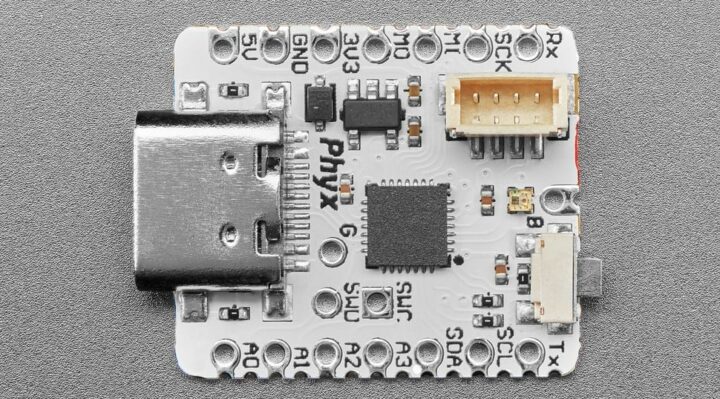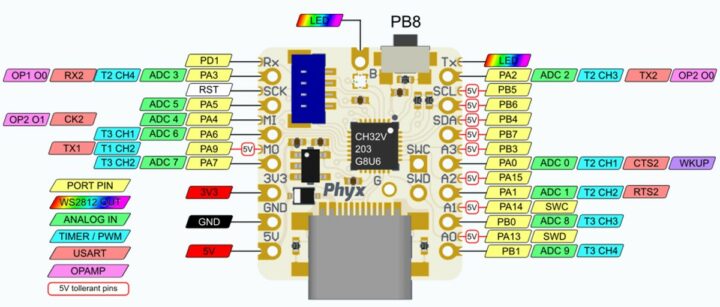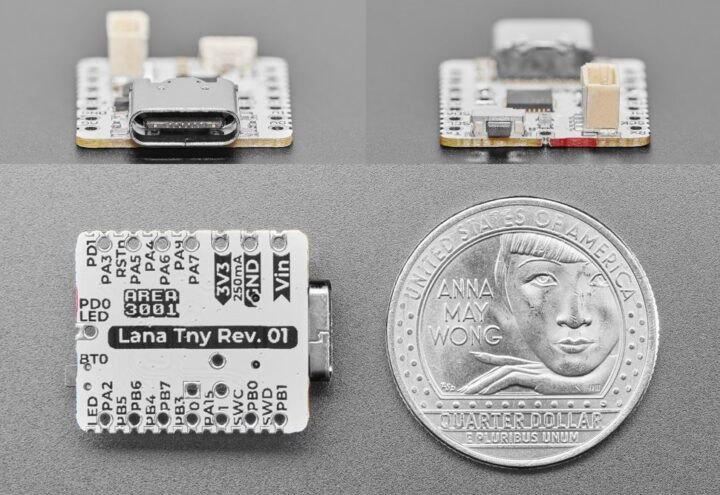The LANA-TNY is a compact development board created by Phyx and built around the CH32V203 RISC-V microcontroller. It offers a low-cost solution for embedded development and features a built-in USB bootloader, eliminating the need for an external programmer to flash the firmware. With a USB-C connector and a minimalist design, the board provides essential components to start development quickly.
At its core, the Phyx LANA-TNY is powered by the CH32V203G6U6, a 32-bit RISC-V microcontroller from WCH Electronics, capable of running up to 144MHz with 1-cycle multiply/divide operations. It includes 10KB of SRAM, 32KB of single-cycle Flash, and 224KB of additional external flash for program or data storage, though the external memory operates at a slower speed.
The CH32V203 microcontroller supports a range of peripherals, including ADC, timers, USB devices, UART, I2C, and SPI, making it suitable for a wide variety of embedded applications. Designed in the style of Adafruit’s QT Py and Seeed Studio’s XIAO boards, the Phyx LANA-TNY offers a simple, affordable platform for RISC-V-based projects.
Phnx LANA-TNY specifications:
- MCU – WCH CH32V203G6U6
- CPU – Single core 32-bit RISC-V clocked at 144MHz
- Memory – 20KB SRAM
- Storage – 64KB Flash
- Package – QFN28
- Storage – 224KB of external flash with XIP support used for program or data storage
- USB – Type-C connector for power and programming
- Expansion I/Os
- 2x 7-pin 2.54mm pitch headers and in between them 1.27mm castellated holes with
- Up to 20x GPIO
- Up to 10x ADC
- Up to 9x PWM pin
- Up to 2x USART
- 2x headers for LED
- +5V, +3.3V and GND
- 3x SWD pins (SWD Clock line, SWD Data line, and GND) for flash/debug
- 4-pin 1mm SMD pitch Stemma QT connector for I2C
- 2x 7-pin 2.54mm pitch headers and in between them 1.27mm castellated holes with
- Misc
- WS2812B RGB addressable LED connected to PD0 pin
- Push-button BOOT switch
- Power – 5V input via Type-C USB
- Dimension – 20.3 x 17.8 mm
The LANA-TNY board features a single WS2812B RGB addressable LED connected to pin PD0 of the CH32V203G6U6 microcontroller. The WS2812B allows control of color and brightness using a single data line via its DI pin. While capable of being daisy-chained, in this case, only one LED is present, and control is achieved through the microcontroller’s firmware by managing data transmission to the LED.
For software support, Phyx recommends using the Embeetle IDE which provides official support for the board. Alternatively, you can program the board using the Arduino IDE with the WCH32 core, Platform.io with WCH-Link, Charles Lohr’s CH32V003fun, or WCH’s MounRiver Studio. For more details, visit Phyx’s official GitHub page.
The LANA-TNY RISC-V CH32V203 mini microcontroller board by Phyx is available on Adafruit’s official store for $6.50. However, to qualify for free shipping, your order must reach a total value of $200. It’s the second time we have covered a CH32V203 development board, as we previously wrote about the Polos CH32V203F8 Breakout Alef with a larger, albeit still small design.
Via Hackster.io

Sayantan Nandy, an electronics engineer with over four years of hands-on experience in PCB design, circuit development and power electronics, is proficient in EAGLE CAD, Ki-Cad, and Altium. He has a proven track record of delivering efficient and effective systems. His expertise extends from R&D, and prototyping to production support, making him a valuable asset to any engineering team.
Support CNX Software! Donate via cryptocurrencies, become a Patron on Patreon, or purchase goods on Amazon or Aliexpress









Cool. I’d like to see more cheap/small boards with the CH32V305/7. Those chips have high speed 480Mbit USB. For 305 there is WCH-Link E itself which can be repurposed – or there are a bit cheaper (~$3) and smaller WH-Link E mini boards on aliexpress – but both have only 7 pins available. And for 307 there is this nice ~$6USD CH32V307VCT6 board with ethernet an tons of pins available but even with desoldered ethernet it is still slightly too big. But otherwise the 30x family is not that popular (yet?).
Yep, these could definitely be incorporated into plenty of products to bring USB connectivity (audio, data sampling, HID, storage, networking, whatever).
To flash it, you can use this opensource software: https://github.com/ch32-rs/wchisp